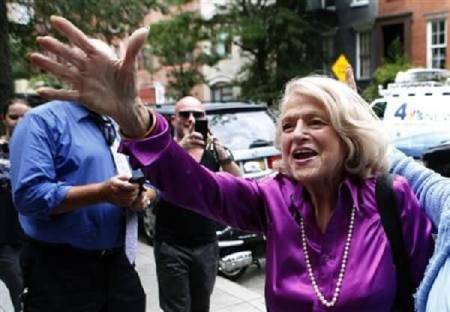LGBT Activist Credited for Gay Marriage Legalization Says She'll Move to Barcelona if Trump Elected President

Eighty-seven year-old Edie Windsor, one of the leading LGBT activists who pushed for the legalization of same-sex marriage in the United States, has reportedly said she's contemplating a move to Barcelona with her new 51-year-old wife if Donald Trump is elected to be the next president.
The New York Times reported that the marriage ceremony between Windsor and Judith Kasen, a vice president at Wells Fargo Advisors, took place this past week at New York's City Hall.
Windsor's previous marriage in 2007 to Thea Spyer, who died two years later, became the basis of a major lawsuit that went all the way to the U.S. Supreme Court and paved the way for the legalization of gay marriage.
As the sole heir of Ms. Spyer's estate, Windsor subsequently owned the IRS tax bill of $363,000, the Times reports, because gay marriage was not legal at the time." The I.R.S. refused her claim that she was entitled to an exemption, and Ms. Windsor sued for a refund with her lawyer, Roberta Kaplan."
The Supreme Court decided in a 5-4 decision in 2013 that the Defense of Marriage Act, which preserved traditional marriage as a union between one man and one woman, was unconstitutional.
The decision helped set the precedent for other cases, such as the landmark Obergefell v. Hodges case, which legalized gay marriage nationwide in 2015.
The newly wed couple has also said that they are "contemplating a four-year move to Barcelona," should Republican presidential nominee Donald Trump become president following November's elections.
Trump has in the past suggested that he would consider appointing judges to overturn the Supreme Court decision that legalized gay marriage in the U.S., and said that it would be a better system if states were allowed to continue making their own decisions on the controversial issue.
"I disagree with the Supreme Court from the standpoint, they should have given the states, it should be a state's rights issue," Trump said in an interview in February.
"I would have much preferred that they ruled at a state level and allowed the states to make those rulings themselves," he added, further suggesting that reversing the decision would help unite America again.





















